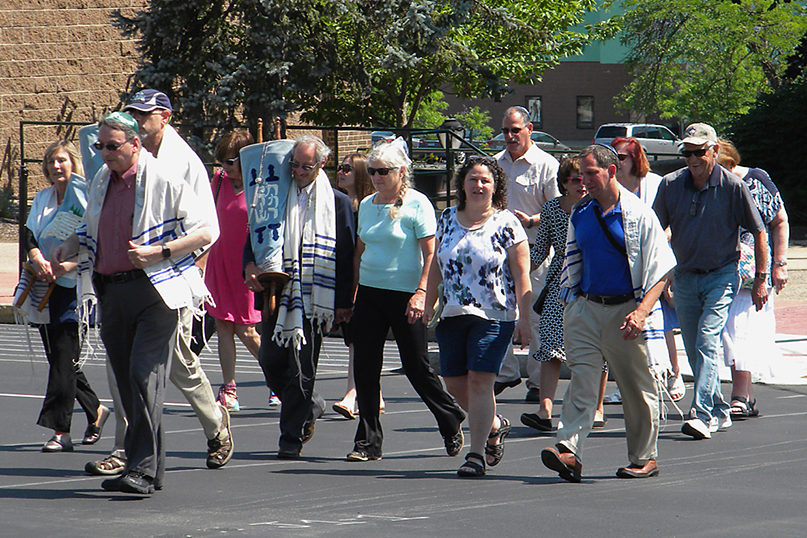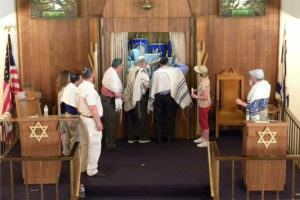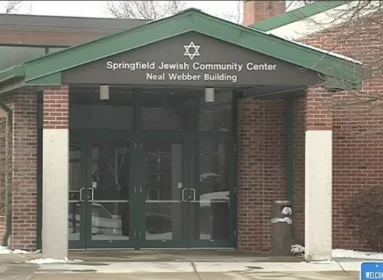
Meriden meets Middletown as two synagogues merge
By Stacey Dresner
MIDDLETOWN – On Monday, July 1, Temple B’nai Abraham in Meriden merged with Congregation Adath Israel in Middletown – a partnership that leaders from both congregations call “a great match.”
B’nai Abraham, which celebrated its 130th anniversary this year, had already sold its 60-year-old building on East Main Street to the Meriden Church of Christ in December. Since then, they had been holding services in a rented house around the corner from their old synagogue.
A strong Jewish presence in Meriden and the surrounding towns in New Haven County for many years, the synagogue, in recent years, had been dealing with a dwindling membership.
“Basically our congregation has been shrinking as many Conservative congregations are,” says Jay Weiss, president of B’nai Abraham. “Last year we cancelled our Thursday morning minyan. We were getting down in numbers and unfortunately the average age of our congregation was 76.”

Congregants from Temple B’nai Abraham and Congregation Adath Israel place B’nai Abraham’s Torah in the Adath Israel ark – its new home.
The B’nai Abraham building, which at one time had housed a membership of more than 400 families and a large Hebrew school, became way too big for its current membership of around 109 individuals and families. The Hebrew school closed years ago.
B’nai Abraham had sought to merge with another congregation for a number of years, Weiss said, but none of those efforts came to fruition.
After talks with several synagogues over the past year and a half, however, B’nai Abraham found the perfect synagogue to merge with in Congregation Adath Israel, a conservative synagogue with its own rich history. Founded 117 years ago, Adath Israel has a membership of 150 families.
“It’s a very good match for us in all respects,” Weiss says.
When it moved out of its synagogue building, B’nai Abraham donated its Holocaust book collection to the Meriden library. Other items, such as prayer memorial plaques, have been moved to Adath Israel, where the plaques will be hung up in their new home. B’nai Abraham’s cemetery will now be managed by the Association of Jewish Cemeteries.
Two B’nai Abraham members will soon be appointed to the Adath Israel board of directors.
The newly merged synagogue will continue with the name Congregation Adath Israel, but the heritage of B’nai Abraham is being honored by the merged congregation and celebrations of the merger are expected to take place through the summer and fall.
On June 30, after a special minyan service, the members of Temple B’nai Abraham, along with members of Adath Israel, walked its Torahs from Meriden to their new home at Adath Israel.
“It was a very smooth process from day one,” says Jonathan Shaprio, president of Adath Israel. “I think we were like-minded and open with each other. We had a courting period, then we dated, we got engaged and we got married.”
A long, rich history
The story of Temple B’nai Abraham begins in 1889, when an official charter was issued to Chevra B’nai Abraham. In 1891, the congregation erected a place of worship on Cedar Street to house the congregation’s 125 member families. The congregation also purchased land for its own cemetery and had its own chevra kadisha – a “holy society” of Jews who prepare the body for burial in accordance with Jewish law.
In 1941, B’nai Abraham purchased property on East Main Street, but due to World War II, planning for a new synagogue was put on hold. In 1942, Chevra B’nai Abraham became an affiliate of the United Synagogue of America.
Groundbreaking for the new B’nai Abraham building took place on Feb. 18, 1951 and the cornerstone was laid on Sept. 9 of that same year.
At that time there were 360 member families and 200 children enrolled in B’nai Abraham’s religious school. Membership grew to 450 families and 250 Hebrew school children when Jews from Cheshire, Southington and Durham joined the congregation.
For years, B’nai Abraham was the home of a strong and active Men’s Club, Sisterhood, Jewish War Veterans Post #92, a local chapter of the Zionist Organization of America, Hadassah, and numerous youth activities for both young children and teenagers.
Over the years, B’nai Abraham’s guest speakers included luminaries such as Eleanor Roosevelt, Governor John Cabot Lodge, Governor and then Senator Abraham Ribicoff, and Senator Lowell Weicker.
Rabbi Michael Kohn, who has been spiritual leader of B’nai Abraham since 2008, is in the last year of his contract. Rabbi Marshal Press has been interim rabbi at Adath Israel since the departure of Rabbi Seth Haaz. Rabbis Kohn and Press will both serve part-time at the new Adath Israel, Shapiro said, while the congregation conducts a search for a new full-time rabbi.
“This is a pretty exciting time for us,” Shapiro says. “Change can be tough but we have had exciting changes with the merger being one of them, and then at the same time to have the opportunity to have a new rabbi come in whose first experience will be the united congregation, I think that is an exciting way to build our future.”
Main Photo: Congregants from Temple B’nai Abraham and Congregation Adath Israel carry B’nai Abraham’s Torah from its former home in Meriden to its new home in Middletown.







 Southern New England Jewish Ledger
Southern New England Jewish Ledger













